- Trending:
- Olympics
- |
- Forgiveness
- |
- Resurrection
- |
- Joy
- |
- Afterlife
- |
- Trump
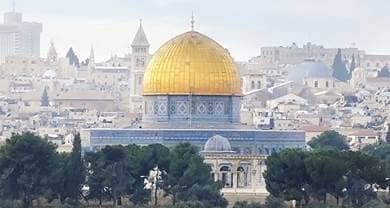
RELIGION LIBRARY
Islam
Sacred Narratives
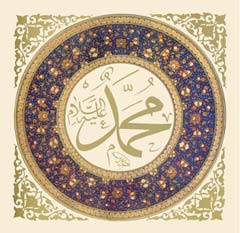 The Islamic sacred narrative issues primarily from the life and experiences of Muhammad. Muslims believe that his prophetic role recovers and completes the story of Allah's revelation to humanity. This story is told in the Quran, which includes the account of divine revelation from creation.
The Islamic sacred narrative issues primarily from the life and experiences of Muhammad. Muslims believe that his prophetic role recovers and completes the story of Allah's revelation to humanity. This story is told in the Quran, which includes the account of divine revelation from creation.
The Quran says that the world began when God created everything in six days. The world and everything in and around it came into being through God's word. God commanded, "Be," and it was. The Quran does not give a day-to-day account of the creation, nor does it say that God rested on the seventh day. Instead, after completing his creation, God sat on his throne, regulating the world. The world will end on the Last Day, when God will  resurrect the dead and judge each person according to his or her deeds. The story of God, the world, and humanity is one in which God, compassionate and merciful, sends prophets to guide us in the right way of living. While Islam's most sacred stories are found in the Quran, there are a variety of other canonical sources, including the hadith, that give traditional stories about the prophets that Muslims recognize.
resurrect the dead and judge each person according to his or her deeds. The story of God, the world, and humanity is one in which God, compassionate and merciful, sends prophets to guide us in the right way of living. While Islam's most sacred stories are found in the Quran, there are a variety of other canonical sources, including the hadith, that give traditional stories about the prophets that Muslims recognize.
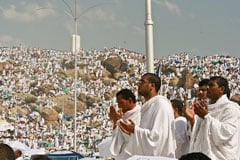 The first prophet was Adam, the first human being, who was the "father of mankind." This is the same Adam of the Jewish (and Christian) Bible. God created Adam from clay, and breathed the spirit of life into him. Then he commanded all the angels to bow before Adam. Only Iblis (Satan) refused, and by his rebellion brought about the fall from paradise. According to some traditions, Adam and Eve were separated after being driven from paradise. Adam landed on the island of what is today known as Sri Lanka, where he spent 200 years doing penitence. Then the archangel Gabriel took Adam to Mount Arafat near Mecca, where he was reunited with Eve. God then ordered Adam to build the Kaaba, and Gabriel taught Adam the rites of pilgrimage.
The first prophet was Adam, the first human being, who was the "father of mankind." This is the same Adam of the Jewish (and Christian) Bible. God created Adam from clay, and breathed the spirit of life into him. Then he commanded all the angels to bow before Adam. Only Iblis (Satan) refused, and by his rebellion brought about the fall from paradise. According to some traditions, Adam and Eve were separated after being driven from paradise. Adam landed on the island of what is today known as Sri Lanka, where he spent 200 years doing penitence. Then the archangel Gabriel took Adam to Mount Arafat near Mecca, where he was reunited with Eve. God then ordered Adam to build the Kaaba, and Gabriel taught Adam the rites of pilgrimage.
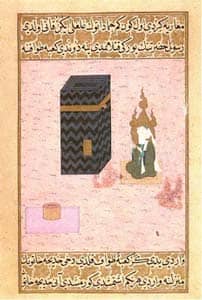 Another significant prophet in Islam is Abraham, (Arabic, Ibrahim), the Abraham of the Bible. Islam teaches that Abraham was the founding father, or patriarch, of Judaism, Christianity, and Islam. All three religions view Abraham as the exemplar of monotheistic faith. God called Abraham out of Ur to the land of Canaan, where he was promised as many descendants as stars in the sky. Abraham and his wife Sarah were very old, so Sarah encouraged Abraham to have a child with her Egyptian servant, Hagar. Hagar gave birth to a son, called Ishmael (Arabic, Ismail). The Quran contains the story in which God commanded Abraham to sacrifice his son, but does not name the son. Many Muslims believe that son was Ishmael. Later Sarah miraculously gave birth to a son of her own, called Isaac. Jealous of Abraham's firstborn son, Sarah insisted that Abraham banish Hagar and Ishmael.
Another significant prophet in Islam is Abraham, (Arabic, Ibrahim), the Abraham of the Bible. Islam teaches that Abraham was the founding father, or patriarch, of Judaism, Christianity, and Islam. All three religions view Abraham as the exemplar of monotheistic faith. God called Abraham out of Ur to the land of Canaan, where he was promised as many descendants as stars in the sky. Abraham and his wife Sarah were very old, so Sarah encouraged Abraham to have a child with her Egyptian servant, Hagar. Hagar gave birth to a son, called Ishmael (Arabic, Ismail). The Quran contains the story in which God commanded Abraham to sacrifice his son, but does not name the son. Many Muslims believe that son was Ishmael. Later Sarah miraculously gave birth to a son of her own, called Isaac. Jealous of Abraham's firstborn son, Sarah insisted that Abraham banish Hagar and Ishmael.
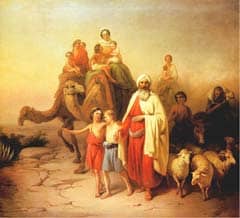 Hagar and Ishmael traveled toward Mecca. Dying of thirst in the desert, they were saved when a spring of water miraculously flowed from the sand. Abraham, learning that they had survived, traveled to Mecca to visit them. Some traditions say that Abraham and Ishmael built the Kaaba to celebrate the miracle in the desert, while others say they rebuilt it. Among the rites of pilgrimage are rituals that honor the experiences of Adam and of Hagar and Ishmael.
Hagar and Ishmael traveled toward Mecca. Dying of thirst in the desert, they were saved when a spring of water miraculously flowed from the sand. Abraham, learning that they had survived, traveled to Mecca to visit them. Some traditions say that Abraham and Ishmael built the Kaaba to celebrate the miracle in the desert, while others say they rebuilt it. Among the rites of pilgrimage are rituals that honor the experiences of Adam and of Hagar and Ishmael.
The sacred history of Islam teaches that after Abraham, God sent many prophets, including Moses, David, and Jesus, to guide humanity on the right path. The prophetic tradition in the Quran also includes indigenous, parallel Arabian prophets as well. But in spite of receiving God's revelations through these prophets, humanity eventually embellished or distorted the message. Finally, among Abraham's descendants in Mecca, God raised the last prophet, Muhammad, and founded a new community of Muslims who would follow the pure religion of Islam. This would be God's final message of absolute monotheism for the whole of humanity, 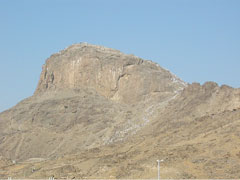 and it would avoid the distortions of the past. This time, it would be a complete, fully realized system that would account for all aspects of human life.
and it would avoid the distortions of the past. This time, it would be a complete, fully realized system that would account for all aspects of human life.
Muhammad is the central prophet of Islam. Before he began his service to God as a prophet, he distinguished himself among the Meccans as an honest, moral, and wise man, an accomplished diplomat who held himself aloof from the pagan religious practices of his time. When he was forty years old, he began seeking solitude in a cave in the mountains in order to meditate. One day he came home greatly agitated, crying to his wife Khadija for help. He was distraught and overcome with panic  because he had experienced a powerful vision of the archangel Gabriel. Muhammad had been called to be the Messenger of God. Many Muslims believe this happened on the night of the 26th of Ramadan (the ninth month in the Islamic calendar), and call it the "Night of Power." Muhammad continued to receive revelations and speak them to the people until his death.
because he had experienced a powerful vision of the archangel Gabriel. Muhammad had been called to be the Messenger of God. Many Muslims believe this happened on the night of the 26th of Ramadan (the ninth month in the Islamic calendar), and call it the "Night of Power." Muhammad continued to receive revelations and speak them to the people until his death.
The Quran also tells the story of Muhammad's miraculous Night Journey (isra) and Ascension (miraj), which is celebrated on the 27th of Rajab (the seventh month in the Islamic calendar). The archangel Gabriel awoke Muhammad as he slept near the Kaaba in Mecca, and escorted him to "the farthest Mosque" (surah 17.1). The "farthest mosque" became associated in early traditions with the Temple Mount in Jerusalem. The hadith  describe Muhammad's night journey in some detail. Gabriel came with Buraq, a winged beast, placed Muhammad on Buraq's back, and took him to Jerusalem where Muhammad prayed at the Temple Mount. Muhammad ascended from the Temple Mount into the heavens. Gabriel took Muhammad up into each of the seven heavens, and introduced Muhammad to angels and prophets living in each of them. Muhammad met and prayed with Abraham, Moses, and Jesus, and others. He was taught the proper method of prayer and was shown heaven and hell. One tradition records that when they came to the tree at the end of the universe, Gabriel parted from Muhammad, unable to travel beyond the universe because angels do not have the ability to choose faith, as humans do. Muhammad, a human who chose faith, went alone on a silk carpet to the Divine Throne of God.
describe Muhammad's night journey in some detail. Gabriel came with Buraq, a winged beast, placed Muhammad on Buraq's back, and took him to Jerusalem where Muhammad prayed at the Temple Mount. Muhammad ascended from the Temple Mount into the heavens. Gabriel took Muhammad up into each of the seven heavens, and introduced Muhammad to angels and prophets living in each of them. Muhammad met and prayed with Abraham, Moses, and Jesus, and others. He was taught the proper method of prayer and was shown heaven and hell. One tradition records that when they came to the tree at the end of the universe, Gabriel parted from Muhammad, unable to travel beyond the universe because angels do not have the ability to choose faith, as humans do. Muhammad, a human who chose faith, went alone on a silk carpet to the Divine Throne of God.
These sacred narratives speak to the six core beliefs that unite most Muslims. They include 1) the reality of one God; 2) the existence of the angels of God; 3) the authority of the books of God, especially the Quran; 4) following the prophets of God, especially Muhammad; 5) preparation for the Day of Judgment; and 6) the supremacy of God's will.
Study Questions:
1. What is the focus of Islam’s sacred narrative?
2. How does the Quran portray the beginning and end of time?
3. Who are the significant prophets of Islam? What did they each contribute?
4. What does the Quran teach about Muhammad?
5. What are the six core beliefs that unite most Muslims?










